Radiology services
X-ray
Opening Hours
|
Nobles Hospital – General x-rays |
Monday to Friday (excluding bank holidays) 8.30am – 5pm Walk-in service, no appointment necessary On call x-ray service provided for emergency department & wards outside of these hours |
|
Ramsey District & Cottage Hospital – General x-rays and Bone Densitometry |
Monday to Friday (excluding bank holidays) 9am – 5pm Appointment Only |

An x-ray is a widely used test which creates an image of the inside of the body, much like a photograph. It is often the first point of investigation to help your doctor decide if other forms of imaging or tests are needed.
Once you have booked in at reception you will wait in the waiting room until called through by the radiographer. Depending on the examination you are having, you may be asked to change into a hospital gown if you are wearing clothes with metal fastenings that will obscure the x-rays such as zips or a bra.
Your examination will be undertaken by a HCPC registered radiographer who will introduce themselves to you and explain the procedure. The radiographer will place the part of your body being imaged against an x-ray detector and may ask you to move into different positions. The x-ray tube will be carefully aimed at the part of the body being examined and the radiographer will operate the machine from behind a screen. More than one x-ray may be taken from a different angle to provide as much information as possible.
You won’t feel anything while the x-ray is being taken and it lasts less than a second. While the x-ray is being taken you will need to remain as still as possible to make sure a clear image of your body part is produced.
Your results are normally with your referring clinician or GP within 5-7 working days. If you are an in-patient, the results will be given to the doctors looking after you on the ward, in most cases this will be on the same day.
Visit NHS Choices – x-ray to find out more.
See also:
British Institute of Radiology
X-rays – How safe are they?
Royal College of Radiologists
Fluoroscopy
Fluoroscopy is a study of moving body structures, similar to an x-ray “movie”. A continuous x-ray beam is passed through the body part being examined and transmitted to a TV-like monitor so that the body part and its motion can be seen in detail.

Depending on the examination you are having you may have to follow a restricted diet for a few hours before your procedure.
The examination will be carried out by a radiologist and a radiographer and some fluoroscopy procedures also involve a Speech & Language Therapist. If you are having a barium meal/swallow/follow through which looks at specific parts of your gastrointestinal tract, we will ask you to drink some cups of barium. We will then take x-rays at various intervals to follow the barium through your body.
Barium is harmless chalky liquid but may take several days to pass through your system after the procedure so you should drink plenty of fluids in the day or two following your examination. You may notice your stools are a whitish colour for a few day until you have expelled all of the barium from your system.
Your results are normally with your referring clinician or GP within 5-7 working days. If you are an in-patient, the results will be given to the doctors looking after you on the ward, in most cases this will be on the same day.
Other fluoroscopy procedures look at gynaecology or urology problems or can help with pain management by using the x-ray movie to have a joint injection.
Interventional Radiology
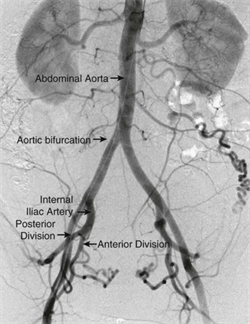 The Interventional Radiology service is situated in the Angiography Suite in the Radiology Department at Nobles Hospital.
The Interventional Radiology service is situated in the Angiography Suite in the Radiology Department at Nobles Hospital.
Interventional Radiology (abbreviated IR) is an area of radiology where minimally invasive image-guided procedures are used to diagnose and treat disease in nearly every body part. This reduces risk and improves patient outcomes.
Interventional radiologists use x-rays, CT and ultrasound to guide instruments through the body. Procedures are performed through thin tubes and do not require surgery.
We perform procedures to stop bleeding via embolization, pain management by radiofrequency ablation, dialysis access, correcting biliary and urological obstruction and the treatment of vascular disease.
CT scans
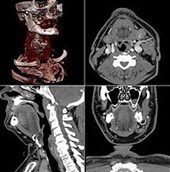 Opening hours
Opening hours
Monday to Friday 9am to 5pm (excluding Bank Holidays)
If you are taking medicines for diabetes, eg metformin, these may need to be altered around the time of the scan. As soon as you receive your appointment letter, call us for advice.
CT stands for computerised tomography. A CT scan uses x-rays to take detailed pictures of the inside of your body. A standard x-ray does not give the same level of detail as a CT scan. A scan usually takes 10 - 20 minutes. If any preparation is needed, you may need to come to hospital 1 hour before your scan.
Sometimes we need to give you an injection of contrast dye before the scan, to help us see your internal organs better. This contains iodine, which some people are allergic to. Before your scan we will check whether you have had any previous allergies.
If you need an injection of contrast dye one of the CT staff will insert a small needle into a vein in the back of your hand or arm. When it is injected, you might feel a hot flush and get a metallic taste in your mouth. Some patients can experience a sensation of passing urine but they don't actually do it. These sensations are normal and pass within minutes.
If we are scanning your abdomen, we may need to give you a drink which has contrast dye (or sometimes water). Try to avoid passing urine until your scan is over.
Results are normally with your referring clinician or GP within 5-7 working days.
To find out more information please see NHS Choices - CT scan.
MRI scans
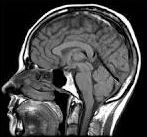 Opening hours
Opening hours
Nobles Hospital: Monday to Friday 9am to 5pm (excluding Bank Holiday)
MRI stands for magnetic resonance imaging. A combination of strong magnet and radiowaves produce detailed pictures of the inside of your body. Unlike x-rays and CT (computerised tomography) scans, MRI scans do not use radiation.
MRI scans are particularly good at identifying problems in the spine, brain and joints. A standard x-ray does not give the same level of detail as an MRI scan.
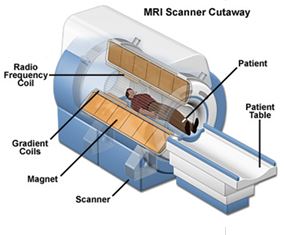 The scanner is a short tunnel, so if you suffer from claustrophobia (fear of enclosed spaces) please let us know before you come for your scan.
The scanner is a short tunnel, so if you suffer from claustrophobia (fear of enclosed spaces) please let us know before you come for your scan.
Sometimes we need to give you an injection of contrast dye before the scan. This contains gadolinium, which some people are allergic to. Very rarely it can cause an allergic reaction which is similar to hay fever (runny nose and itchy eyes).
If you are pregnant, national safety guidelines recommend that we do not carry out an MRI scan unless it is clinically urgent. The doctor who refers you for the scan will decide with the radiologist if your scan is necessary. Many pregnant women have had MRI scans with no reported problems. For further information please call the department.
Results are normally with your referring clinician or GP within 5-7 working days.
To find out more information please see NHS Choices - MRI scan.
See also:
Ultrasound
 Opening hours
Opening hours
Nobles Hospital: Monday to Friday 8.30am to 5pm (excluding Bank Holiday)
The ultrasound department is spread across 3 locations at Noble's Hospital:
- Radiology Department
- Women and Children's Department
- Manx Breast Unit
It is very important for you to check your appointment letter to ensure you attend the correct department for your scan.
An ultrasound scan uses high frequency sound waves to produce pictures of the inside of your body. It helps us find the cause of your problem, and the best treatment options for you. Ultrasound is a very safe test in that there are no x-rays or other types of radiation used in order to complete the examination.
Results are normally with your referring clinician or GP within 5-7 working days.
To find out more information please see NHS Choices - Ultrasound scan.
Nuclear Medicine
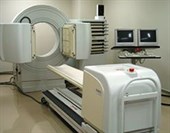
Our Nuclear Medicine services are currently provided in Liverpool by Liverpool University Hospitals NHS Trust.
Nuclear Medicine involves using small amounts of radioactive materials to diagnose a variety of diseases and conditions. The radioactive material, called a radiopharmaceutical, is designed to collect in the part of the body we want to study or treat. Radiation doses are kept as low as possible.
Pictures are then taken of the radioactive material in the body with the gamma camera.
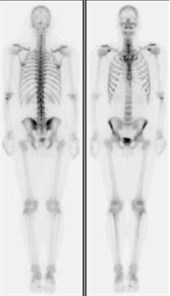
Pictures can be taken of:
- Bones
- Thyroid glands
- Hearts
- Kidneys
- Brains
- Liver & gallbladder
- Lungs
- Oesophageal reflux
- Parathyroid glands
- Lymph system
- Gastrointestinal bleeding
What happens during my appointment?
You will be given full instructions along with your appointment letter from The Royal Liverpool Hospital.
Initially you will attend their Nuclear Medicine department to be given the radioactive material. This can be either:
- By injection into a vein
- By injection into tissue
- By swallowing a liquid
What happens after my scan?
When the scan is finished, you will be told whether you can eat and drink normally or whether you need to avoid vulnerable people for a period of time, e.g. pregnant women.
You may already have an appointment with the healthcare professional that referred you. If not, please arrange one to discuss the results and any treatment you may need.
Results are normally with your referring clinician or GP within 2-3 weeks.
Breast Imaging
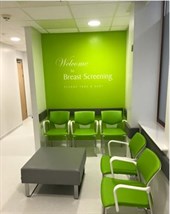 The Breast Screening Unit is located within the Manx Breast Unit in the West Wing of Noble's Hospital on the ground floor.
The Breast Screening Unit is located within the Manx Breast Unit in the West Wing of Noble's Hospital on the ground floor.
As long as you are registered with a doctor in the Isle of Man we will start calling you in the year you turn 50.
You will be invited for your screening by the Manchester Breast Screening Service, who are undertaking the administrative process of the Isle of Man Breast Screening call/recall programme.
Breast Screening Programme
Women aged between 50 and 70 are invited for a mammogram every two years, which uses x-rays to examine the breast to try and detect cancer at its early stages when treatment can be most effective. Women aged 71 and over can self-refer.
Breast screening can help to find small changes in the breast before there are any other signs or symptoms. If changes are found at an early stage, there is a good chance of a successful outcome.
The screening programme will get your details from your DH registration. This record is made up from your doctor's list so it is important that your doctor always has your correct name and address. If you move from the UK, or move to the UK in the future, your breast screening record will transfer to your new area.
Visit the Breast Screening Programme webpage to find out more information.
Symptomatic Breast Clinic
In addition to the Breast Screening Programme, we offer a symptomatic mammography service whereby patients are referred from the Breast Clinic at Noble's Hospital.
To find out more information about breast screening please see NHS Choices - Breast cancer screening.
Bone Densitometry (DEXA) scan
A DEXA scan is a special type of x-ray that measures bone mineral density (BMD). DEXA stands for dual energy x-ray absorptiometry. This type of scan is also often known as DXA, or dual x-ray absorptiometry or someteimes referred to as a bone density or bone densitometry scan.

DEXA scans are often used to diagnose osteoporosis, which is when the bones become weak and fragile, and are more likely to break. They can also be used to assess the risk of osteoporosis developing in women aged over 50 and in men over 60.
As well as being quick and painless, a DEXA scan is more effective than general x-rays in identifying low bone mineral density.
The images we produce will be studied by a Consultant and the results sent through to the healthcare professional that referred you. This can take up to 3 weeks.
Visit NHS Choices – DEXA (DXA) scan to find out more.
See also:
NHS Choices - Osteoporosis
Royal Osteoporosis Society
Vitamin D and Bone Health
Radiology for children
Visiting the Radiology department can be a scary time for a child. It is filled with lots of big machines but we aim to make the process as friendly as possible and make sure your child is put at ease throughout their examination.
We have a paediatric lead radiographer to ensure a quality paediatric service and we work closely with the play specialists and dedicated paediatric team.
We also have a “Kitten Scanner” which is a child-size version of a CT/MRI scanner that allows children to have a go at scanning a special puppet, thus preparing them in a fun way to undergo an examination themselves.
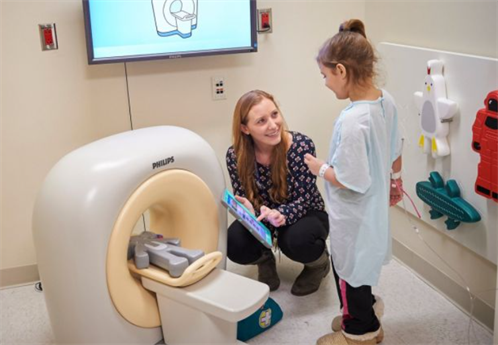
Below is a list of websites and apps to help prepare your child for their appointment in the Radiology department.
Fun Kids Live – How we treat broken bones
CBeebies Dr Ranj’s Hospital Top Tips for parents
Get well soon hospital app with Dr Ranj
Siemens MRI experience app (Google Play Store and Apple Store)
Careers
If you enjoy technology and science, and you can work quickly and accurately, being a radiographer could be an ideal job for you.
In this job you will use different types of radiation to help diagnose or treat patients who are ill or injured. To do this job you will be using highly technical equipment and need excellent communication and people skills. And you’ll need to have a caring approach to patients, some of whom are very ill.
Before you can work as a radiographer you will need to complete a degree or postgraduate qualification approved by the Health and Care Professions Council.
If this is a career you think you would like to pursue, then please contact the Patient Experience Officer to arrange a work experience visit.
Useful links if you are thinking about pursuing a rewarding career as a radiographer:
National Careers Service – Radiographer


 British Institute of Radiology
British Institute of Radiology







